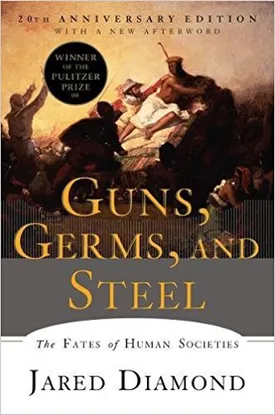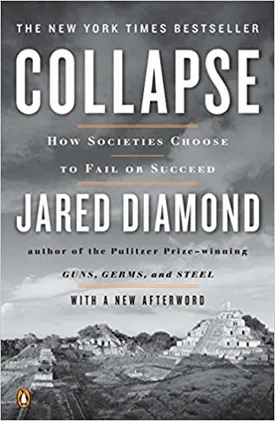Jared Diamond
Jared Diamond is an American scholar, evolutionary biologist, author, and professor of geography at the University of California, Los Angeles. He is best known for his Pulitzer Prize winning book Guns, Germs and Steel, which argues that the long-term developments of human societies are partially a consequence of geographical and ecological advantages or disadvantages.
Diamond is an internationally renowned scientist who has conducted a variety of research projects throughout his life. Born in Boston, Massachusetts in 1937, Diamond was raised in the Philadelphia area from the age of 8. He received a Bachelor of Arts in 1957 and a doctorate in physiology and membrane biophysics in 1961 from the University of Cambridge. After several years teaching physiology and zoology at Harvard, he spent much of his career, first at the University of California, Los Angeles and then as professor of geography at the University of California, Los Angeles.
Diamond has written widely on topics ranging from evolutionary biology, anthropology and anthropology of science, to global environmental issues. His books include the Pulitzer Prize-winning book Guns, Germs, and Steel and The Third Chimpanzee. His often-informal books aim to explain why historically, some societies have flourished and others haven't. He argues that geography and environment have been influential, but that not all societies consciously recognize or act upon this advantage.
Guns, Germs, and Steel is Diamond's most distinguished work. This book seeks to explain why some societies have benefited from their physical environment, while others have not. He argues that the ability of a society to develop technology is influenced by the availability of food and resources. These factors lead to differences in technology and the creation of states or empires. He also examines the consequences of food production, urbanization, and the spread of infectious disease.
Diamond has crossed academic disciplines to discuss the cultural and environmental histories of hunter-gatherer societies. He looks at the challenges they have faced when confronted by large-scale civilizations, and he evaluates their successes and failures.
Diamond has also written several books on contemporary environmental issues. His best-known book in this area is Collapse: How Societies Choose to Fail or Succeed. In this book, Diamond examines why some societies have become robust, while others have become more vulnerable to environmental and societal issues. He advocates for proactive solutions to environmental problems and suggests that society can avert disaster by reappraising current problems.
Since 2019, Diamond has also been actively involved in conservation issues, including efforts to restore Hawaii's Coral Reefs and advocating for conservation efforts for endangered species in Africa.
Jared Diamond's diverse research and works make him one of the world's most authoritative voices on anthropology, evolutionary biology, geography, and environmental issues. His books give an insightful account of the world's changing environments, the consequences of human societies, and the impact of geographical advantages or disadvantages on these societies. Diamond's works are inspiring, informative, and thought-provoking, setting an example for contemporary researchers and contributing to a greater understanding of the world and its societies.


